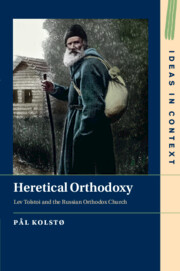Book contents
- Heretical Orthodoxy
- Ideas in Context
- Heretical Orthodoxy
- Copyright page
- Contents
- Preface
- Chapter 1 Introduction
- Chapter 2 Tolstoi as a Practicing Orthodox
- Chapter 3 Tolstoi’s Examination of Dogmatic Theology
- Chapter 4 Tolstoi, Orthodoxy and Asceticism
- Chapter 5 Lev Tolstoi and Orthodox Forms of Spirituality: Elders
- Chapter 6 Tolstoi and the Wanderer Tradition in Russian Culture
- Chapter 7 Tolstoi and the Ideal of “the Holy Fool”
- Chapter 8 Father Sergius: Kasatskii’s Spiritual Journey to Holy Foolishness
- Chapter 9 Tolstoi and the Social Ideal of the Eastern Church: John Chrysostom
- Chapter 10 The Church Mounts a Counterattack: Threat Perceptions and Combat Strategies
- Chapter 11 Between “Almost Orthodox” and “Antichrist”: Images of Lev Tolstoi in Russian Orthodox Polemics
- Chapter 12 The “Excommunication” and Its Aftermath
- Chapter 13 A Requiem for a Heretic? The Controversy over Lev Tolstoi’s Burial
- Chapter 14 Summary and Conclusions
- Bibliography
- Index
Chapter 3 - Tolstoi’s Examination of Dogmatic Theology
Published online by Cambridge University Press: 15 September 2022
- Heretical Orthodoxy
- Ideas in Context
- Heretical Orthodoxy
- Copyright page
- Contents
- Preface
- Chapter 1 Introduction
- Chapter 2 Tolstoi as a Practicing Orthodox
- Chapter 3 Tolstoi’s Examination of Dogmatic Theology
- Chapter 4 Tolstoi, Orthodoxy and Asceticism
- Chapter 5 Lev Tolstoi and Orthodox Forms of Spirituality: Elders
- Chapter 6 Tolstoi and the Wanderer Tradition in Russian Culture
- Chapter 7 Tolstoi and the Ideal of “the Holy Fool”
- Chapter 8 Father Sergius: Kasatskii’s Spiritual Journey to Holy Foolishness
- Chapter 9 Tolstoi and the Social Ideal of the Eastern Church: John Chrysostom
- Chapter 10 The Church Mounts a Counterattack: Threat Perceptions and Combat Strategies
- Chapter 11 Between “Almost Orthodox” and “Antichrist”: Images of Lev Tolstoi in Russian Orthodox Polemics
- Chapter 12 The “Excommunication” and Its Aftermath
- Chapter 13 A Requiem for a Heretic? The Controversy over Lev Tolstoi’s Burial
- Chapter 14 Summary and Conclusions
- Bibliography
- Index
Summary
Examination of dogmatic theology was the title of a huge, unwieldy tome that Tolstoi wrote after having read all the major compendia of Orthodox dogmatics in use at his time. Tolstoi scholarship has ignored this book – and it is easy to understand why: The stylist Tolstoi is conspicuously absent; the polemics against Orthodox theologians are so coarse and overplayed that it is often difficult to take them seriously. But even if we cannot learn much about Orthodox theology from this work, there is important information about Tolstoi’s own thinking to be gained by reading it, as it were, “against the grain.” Such an approach reveals that Tolstoi’s mature theology contained some clearly Orthodox features. For instance, both Orthodox theology in the nineteenth century and Tolstoi operated with a sharply dualistic anthropology, and in their teaching about God they have both a “negative” (apophatic) and a “positive” (cataphatic) theology. Tolstoi even explicitly criticized the leading Russian theologian of the time, Metropolitan Makarii, for having forgotten apophaticism and of having “distorted the deep and sincere speech of the Apostles and Church Fathers.” This selective usage of Orthodox theology did not make Tolstoi an Orthodox, but an original thinker heavily influenced by Orthodoxy.
- Type
- Chapter
- Information
- Heretical OrthodoxyLev Tolstoi and the Russian Orthodox Church, pp. 42 - 70Publisher: Cambridge University PressPrint publication year: 2022

